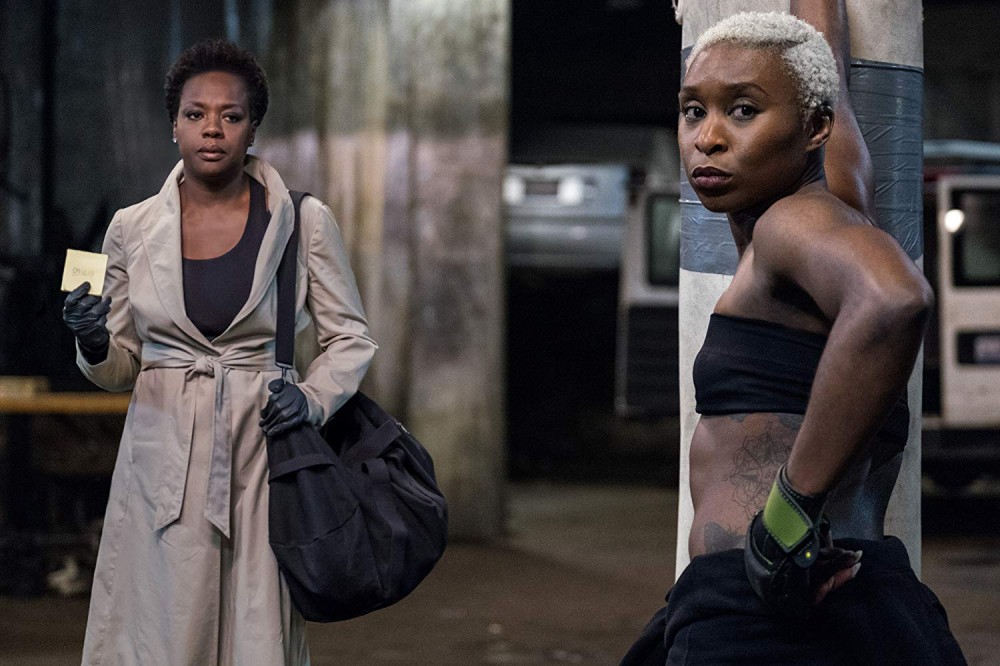“Widows”
With a highly-anticipated script by Steve McQueen (“12 Years a Slave” and “Shame”) and Gillian Flynn (the author of “Gone Girl”), “Widows” is a heist film that both defies and loves genre expectations.
There are the familiar outlines of an “Ocean’s”-esque movie — the assembling of the heist team and explosions, for example. But as a director, McQueen reaches for something much greater and far more nuanced.
In the opening scene, lead widow Veronica (Viola Davis) loses her husband Harry Rawlings (Liam Neeson) in a botched robbery. When Chicago’s 18th Ward alderman candidate Jamal Manning (Brian Tyree Henry) comes to Veronica, demanding that she pay her husband’s $2 million debt, she has no choice but to turn to the prestige crimes her husband committed.
To pull off the act, however, Veronica gathers the other widows left behind after the accident their husbands died in — Linda (Michelle Rodriguez), Alice (Elizabeth Debicki) and a less-so-but-still-thoughtfully-developed Amanda (Carrie Coon). They buy guns, research mysterious blueprints and eventually embark on a dangerous heist.
McQueen has a slick control of tension and plot twists, yielding both knee-shaking anxiety and jaw-dropping reveals. Davis’s performance as Veronica is spell-binding; she embodies the intermingling grief and anger that is central to “Widows.”
But this core plot is sometimes swallowed by the b-plot of the city election, where nepotistic-legacy city politician Jack Mulligan (Colin Farrell) is running against Jamal Manning. The two plot-lines are certainly inseparable, but the connections sometimes construct an unrealistic depiction of life in Chicago.
Everything in the city is connected to these characters’ lives, to Harry’s crimes, to the Mulligan legacy in city politics. These connections are certainly convenient plot devices, but with characters that are so clearly defined by both the script and its actors, it’s easy for some details to not feel as realistic.
Luckily, “Widows” is a good enough heist film for us to ignore this small flaw — it’s a compelling thriller with shocking reveals, emotional depth and a stellar cast. These widows pull off their tricks — and so does the film.
Grade: A-

“Oxnard”
Anderson .Paak’s long-awaited follow-up to 2016’s “Malibu” is finally available. “Oxnard” — released last Friday — is 14 songs long and full of appearances from Snoop Dogg, J. Cole and Kendrick Lamar.
Like “Malibu,” “Oxnard” riffs on hip-hop, funk and soul; Anderson .Paak’s raspy voice reaches for new sonic heights. The album is named for Anderson .Paak’s hometown in California, and he reflects on his rise to stardom from this vantage point.
On “Who R U?” Anderson .Paak references chauffeurs, Dior frames and Japanese denim — symbols of supposed wealth and success. On “Saviers Road” (Google Maps suggests that it’s a specific road in Oxnard), Anderson .Paak mentions those who say they’re proud of him now, but probably doubted him before.
These songs complement the indulgent decadence of the album’s funk-inspired sounds. Anderson .Paak takes a more political turn, however, on “6 Summers.” Here, Anderson .Paak raps about Trump’s “love child” and gun control, themes that aren’t given enough space on the album for the song to fully develop into something meaningful.
The star of the album is “Tints,” which features Kendrick Lamar. “Tints” is the kind of song that can bring summery warmth to a snowy day (but would sound even better from a car speaker with the windows down in August). After hearing “Tints,” it’s easy to wish this album had been released this past summer.
It’s okay, though — something tells us Anderson .Paak and “Oxnard” will sound just as smooth come summer 2019.
Review: B+








